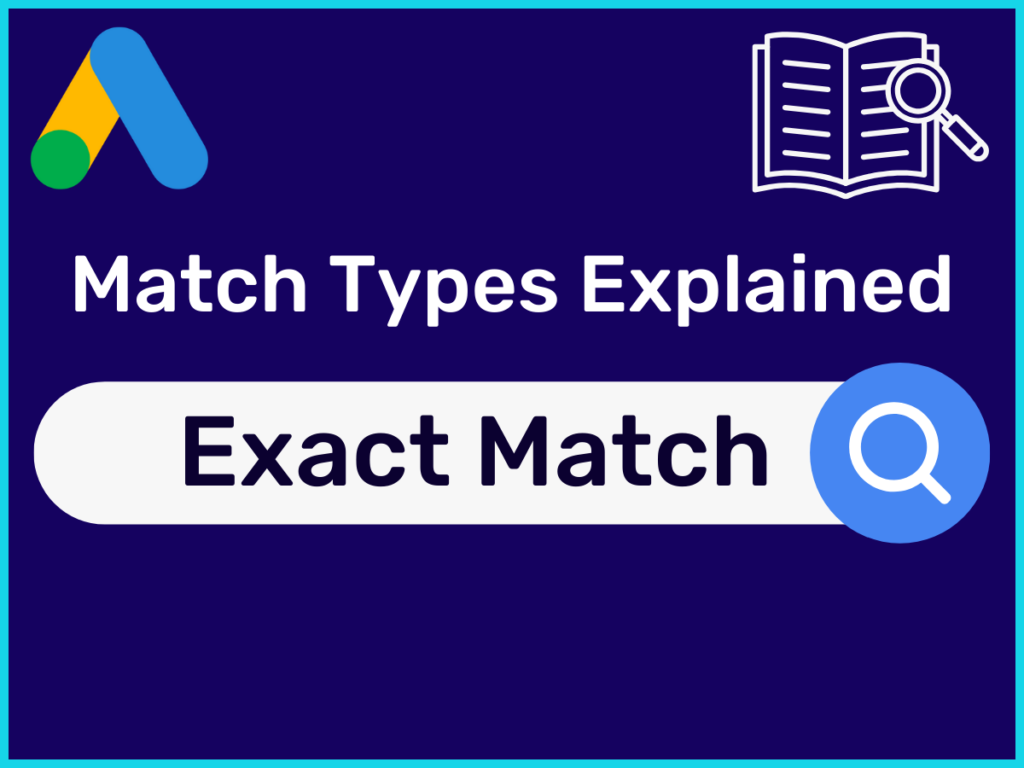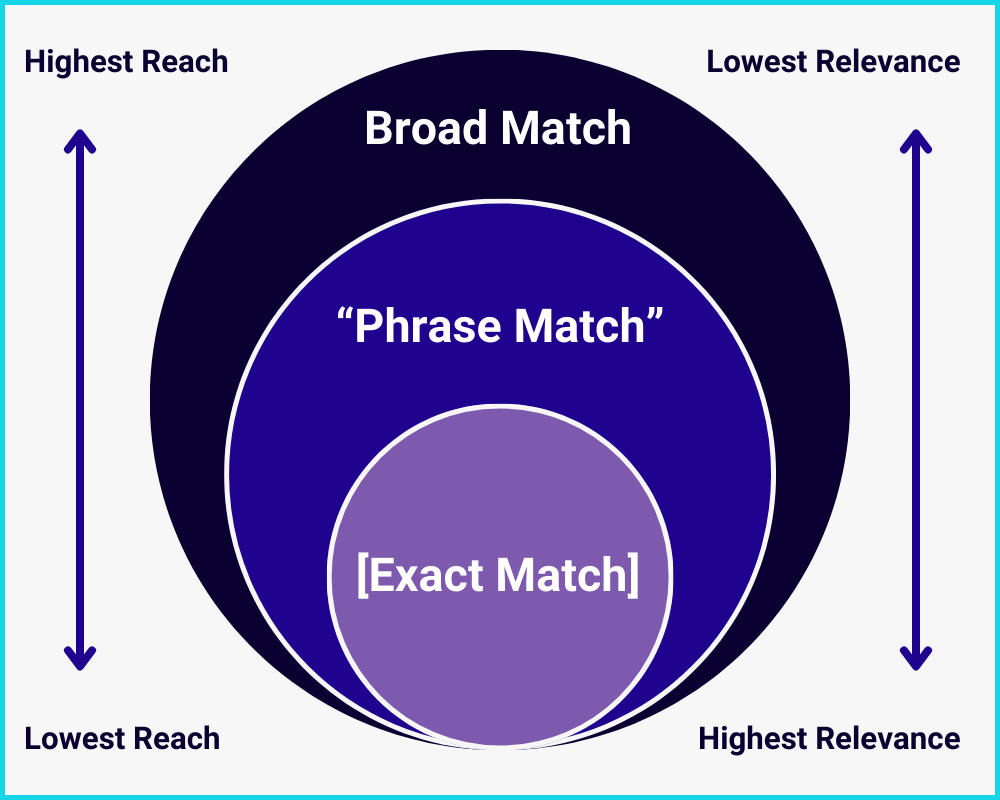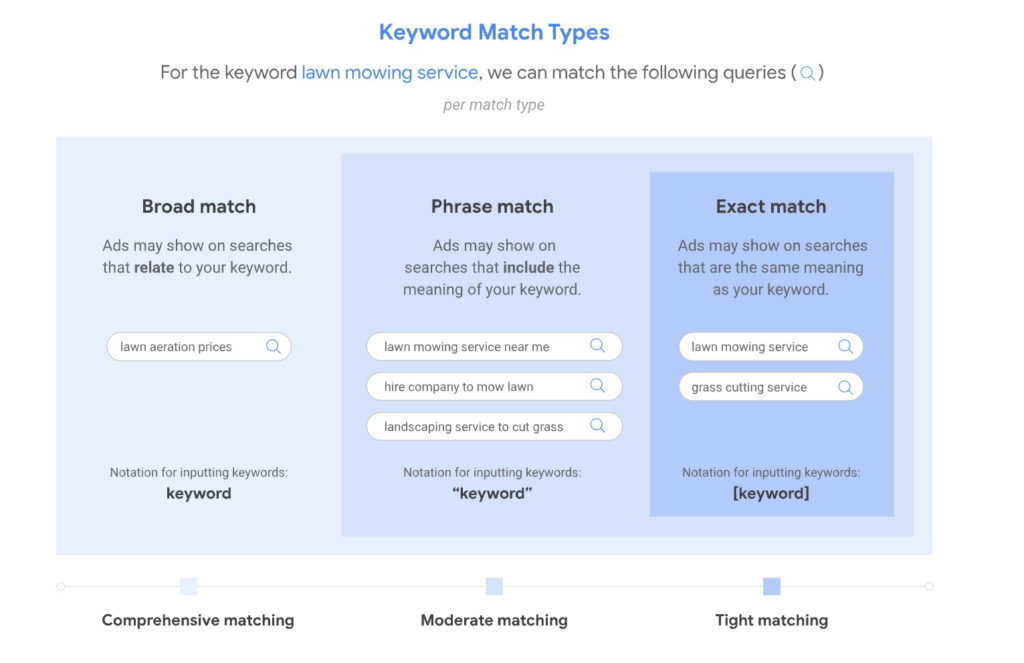von Thimo Hofner

There are 3 different keyword match types in Google Ads, which always leads to confusion and misunderstandings. On top of that, Google Ads keeps changing the way the match types work.
This post is about the match type exact match. I’ll explain how exact match works and how you can successfully use this match type in Google Ads.
At a glance: For a keyword with the match type exact match, an ad is only triggered if the search query has the same meaning or intent. Therefore, Exact Match gives the user the best control.
That was the short definition. Of course, there’s more to clarify so you understand how exact match keywords work. In this post, you’ll find everything you need to know. Here’s an overview:
Before we go further into the exact match type exact match, here is an explanation of the basics: What are match types?
When you add keywords in Google Ads, you can do it in 3 different ways:
Exact Match
Match types give you control over how related a user’s search term should be in order to trigger an ad. As a rule of thumb:
From broad match to exact match, the tolerance decreases. This means that exact match gives you the best control.

Info: In another post, I have also created a detailed overview of all keyword options:
In Google Ads, there are Search Terms and Keywords. Even though these terms sound like synonyms and are often treated as such outside of Google Ads, here, they are two different concepts.
Keywords are words or groups of words that you can add to Google Ads at ad group level. These keywords determine for which searches your ads will be triggered.
Search Terms are the actual and literal search queries that trigger your ads. That is, the search terms give you information about the real user search queries.
For each search query, Google checks whether the search term has the same or a similar meaning as one of your keywords.
If it has a completely different meaning, no ad will be placed.
If the meaning is similar but not exactly the same, the match type of the respective keyword determines whether an ad is triggered or not.
A small example
You run a service business and offer a lawn mowing service. You have created a Google search campaign with relevant keywords.
A user now searches for “Lawn aeration service“
In your campaign, you have entered the keyword “lawn mowing service”.
Depending on which match type you use, an ad is triggered or not:
Exact Match: The ad is NOT triggered
Phrase Match: The ad is NOT triggered
Broad Match: The ad is triggered.
After an update in 2023, keywords are now interpreted even more “broadly”. This is because Google’s algorithms are now extremely good at understanding the semantic meaning of a search query. For this reason, only the meaning of a keyword is now relevant – not the exact spelling.
This can be seen in this overview from Google (where I also took the above example):

Here you can see that even keywords in exact match now trigger ads for semantically relevant search queries, even if they don’t contain the same words.
Info: Very interesting is the classification of match types into the following categories:
Broad Match: ComprehensiveMatch
Phrase Match: Moderate Matching
Exact Match: Tight Matching

For a keyword with the match type exact match, an ad is only triggered if the search term has the same meaning or intent.
So the exact match gives you the best control over which search terms can trigger your ads.
You have to think of Google as a human being. It doesn’t matter if someone is searching for “lawn mowing service” or “service provider to mow lawn” – these search terms have exactly the same intent:
The user is looking for someone to mow the lawn for them.
This is exactly how Google now interprets exact match keywords. Here is another good example image:

Important: It can happen that exact match keywords trigger ads for search terms that you would not really consider relevant. Google is increasingly softening the boundaries here.
For this reason, you should regularly check the search terms report, especially for new campaigns, and exclude irrelevant search terms as negative keywords.
In Google Ads, you can set the match type of a keyword in several ways.
First, you can change the match type by entering the keyword either in quotes (“keyword” – Phrase Match), in square brackets ([keyword] – Exact Match) or without adjustment (keyword – Broad Match).
In the keyword reports in Google Ads, the keywords will be displayed exactly as you entered them. So, all exact match keywords are in square brackets.
Once keywords have been entered, you can easily change the match types via the match types column. If you click with the mouse on the match type, a dropdown menu opens and you can adjust the keyword:

If you want to change many keywords at once, you can simply select them and go to Edit > Change all Match Types to change the Match Type:


The match type exact match gives you the best control when a search term triggers an ad. So, shouldn’t you always use exact match then?
The answer is no. Just like the other match types, using exact match brings advantages and disadvantages:
Maximum control: with Exact Match you can be sure that ads will be triggered (and you will spend money) only if the search query has the same meaning as one of the keywords you want to bid on.
Low scatter loss: exact match minimizes the chance of you bidding and spending money on non-relevant search queries.
High ad relevance: Your ads are only triggered for highly relevant search queries. This allows you to optimize the CTR (click-through rate).
Fewer impressions and clicks: As the strictest match type, exact match limits the possible number of impressions and clicks, as ads are not triggered for similar search terms (which may also be relevant)
Greater effort: if you want to cover a wide range of search terms with your keywords, exact match requires a lot of effort.
No possibility to discover new keywords: With broad or phrase Match, you can always discover new search terms that work well but you didn’t think of. It is worthwhile to store these search terms as new keywords.
You do not have this possibility of optimization with exact match.
Info: According to Google, 15% of all search terms are new. That’s why it’s always worth looking for new keywords.
In Google Ads, in addition to the keywords that include which searches trigger an ad, there are also negative keywords. With these, you can exclude certain words. This way you can further avoid spending money on the wrong searches. For negative keywords, there are the same 3 match type options.
Important: The match types for negative keywords work differently than for the keywords discussed so far. Here, the spelling is crucial.
For negative keywords, the Match Types still work the same way as they used to for normal keywords. That is, it is mainly about the exact spelling.
A negative keyword in Exact Match only blocks search queries that match the keyword exactly in spelling. Here is an example from Google:

In exact Mmatch you therefore must also enter different variations, typos and synonyms of the keyword that you want to block.
I hope I was able to explain the Match Tpyes in this post in an understandable way 😊. I wish you a lot of success with your campaigns!
Work smart, not hard – Clicks in Mind

Hi, my name is Thimo Hofner. I have been working in online marketing as a Google Ads Manager for more than 5 years. Through many courses, trainings and most importantly working with many different clients, I have learned the best strategies for success with Google Ads. On my blog and YouTube, I share my knowledge to help you drive more success with online marketing.